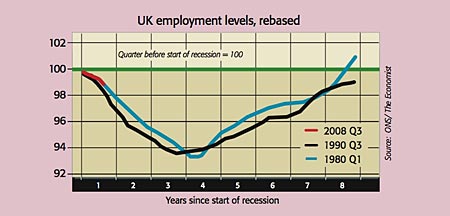
Labour is virtually certain to lose a general election within the next 12 months, says Buttonwood on Economist.com. So how do stocks typically behave when there’s a change of government? It seems it’s a case of “buy the rumour, sell the fact”.
According to ING’s Gareth Williams, stocks tend to do better before the election than after it. In 1979, for instance, the market climbed before the Conservative victory, but lost 7% in the following four weeks.
So stocks will probably rally in anticipation of a Tory win, but the rebound will dissipate – especially since this time round there will be “a hell of a mess to clear up”.
The big picture: a long slog for Britain’s labour market
Employment is a lagging indicator, and it tends to lag for a very long time. It has fallen by 1% since it peaked at 29.5 million in the second quarter, says The Economist, and in the past two downturns troughed at 6% below the previous peak.
It will be at least as bad this time round. This recession is particularly nasty; the fall in output has already reached 4%, close to 1980-1981’s 4.6%. What’s more, recent research by the International Monetary Fund suggests that recessions caused by financial crises tend to lead to a particularly sharp increase in unemployment.